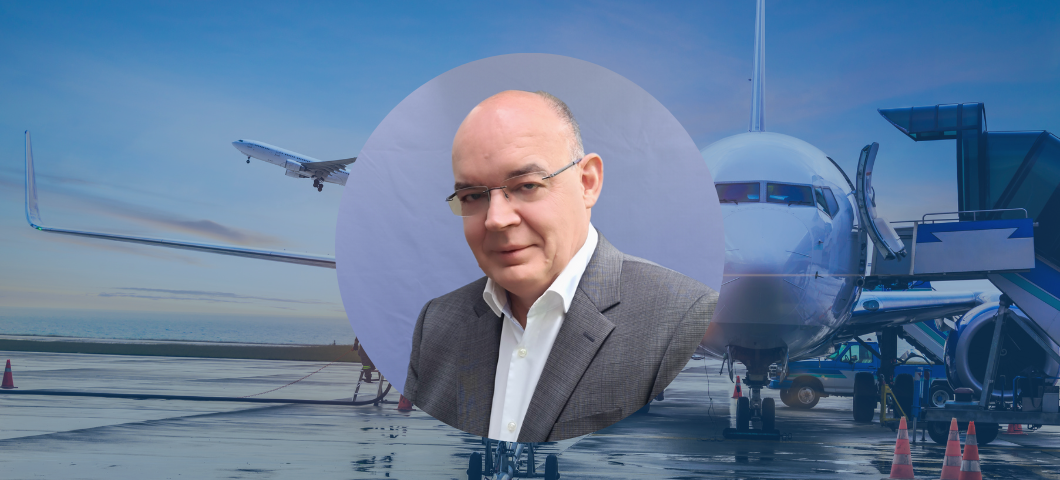
The eternal attempt to revise the EU Airport Slot Regulation – let’s get it right this time!
In this edition of the Five Minute Feature, we have asked Gunter Heinrich from Frankfurt Airport to share his perspective on the current issues linked to airport slots. With his 25 years rich experience in this field, he has a unique view of how the legislation and the practice of it evolved over the years. Watch out for meaty soundbites!
The European Commission is trying once again (or rather, still) to revise the EU Airport Slot Regulation. A lot has happened since the last attempt started in 2011 and which has been blocked in the Council since 2013. The European Commission is currently preparing a new legislative proposal, a process which has seen an extensive exchange of ideas among the interested parties.
When discussing future legislation, it is important to note that it will certainly be valid well into the next decade – at least that is what can be expected from the 30-year history of the EU Slot Regulation and its attempts at revision. Pre-COVID forecasts assumed that by the end of the next decade there would be 16 airports in Europe and 28 airports worldwide with Heathrow-like conditions in terms of slot availability. The mantra constantly recited by the airlines, that the challenges of slot allocation should not be solved by different regulations, but by more airport capacity, will not change anything. Large-scale airport expansion is fiendishly difficult in Europe and the question of the best possible use of this finite capacity must be addressed. In the future, it will no longer just be a question of (almost) all slots being allocated and used, but also of what the scarce airport capacity should be used for.
A bit of history
The basic principles of today’s slot allocation come from the early days of airport coordination in the 1970s. The aim of airport coordination at that time was to avoid excessive peak loads on the airport system while at the same time treating all airlines and all flight requests as equally as possible. At that time, the role of the airport slot coordinator was like that of an usher, who helped the visitors to find a good seat in a well-attended but not sold-out theater. Today, the coordinator is more like a bouncer in a hip club, with the admission criteria used being similarly non-transparent.
The EU Slot Regulation and the comparably important Worldwide Airport Slot Guidelines (WASG) propose a number of criteria to the coordinators, on the basis of which decisions can be made in the event of competing slot requests, but there are no binding specifications about their actual application. The idea behind this is to give the coordinators as much leeway as possible in order to be able to take into account the interests of all parties in their decision-making. Unfortunately, in this process there is little transparency over what the coordinators know, or think they know, about the interests of the respective entities concerned and how they personally weigh these up against each other.
A shift of perspective
The main goal of a new slot regulation must be to finally define the concept of “efficient slot use” which has been eluding the industry and regulators for so long. It is not just the interests of the airlines or the airport operators that have to be taken into account here, but also those of the passenger, the local residents and the (economic) region. The question of how the efficient use of an airport’s capacity is defined can no longer be answered in the context of the airport’s resources alone. This is a question of overall societal relevance.
A frequently-cited means of solving the question of efficient use is market forces. In fact, economists are among the few who have a clear definition of efficiency. From a market perspective, a system is efficient if the market participant with the highest willingness to pay has the opportunity to use the resource in question. Economists therefore often and happily suggest using auctions as an instrument for allocating slots. In this context, people like to refer to the successful auction of mobile phone frequencies in the past. Auctions are certainly a very good tool to help willing market participants succeed, but there are many questions unanswered as to whether slots are a suitable item for an auction.
Slots and auctions – friends or foes?
A slot alone is useless, since you always need the matching departure slot for an arrival slot if you don’t want to scrap the plane at the respective airport. What the ideal pairing of slots looks like depends on the type of aircraft used and the business model. A good ground time for a long-haul aircraft in regular service is 2 hours, for example, while for an aircraft used by a low-cost carrier in Europe it is 40 minutes.
Individual slot pairs are also of no interest to the airlines, it is about slot chains. Whether these chains cover the entire season or just parts of it again depends on the airline’s business model. While providers of scheduled services usually strive for seasonal chains, charter airlines often focus on the holiday season. It is also important to remember that in many cases there is also a coordinated airport at the other end of the flight route. The expensively auctioned chain of slot pairs at an airport would be useless if the required slots were not also available at the other end of the route.
Furthermore, a dominant airline would have a clear advantage in an auction at an airport. Due to their existing large slot portfolio, it is much easier for such an airline to meaningfully integrate new slots acquired at auction into its network planning. A further expansion of market dominance would be the result. These questions all require addressing if ever the idea of trialing slot auctioning is to gain traction.
A look at the alternatives
Another market mechanism is the so-called secondary slot trading. Airlines have the option of selling or leasing slots that they have received in the regular coordination process to other airlines. This was and is practiced in the United Kingdom, particularly at Heathrow Airport. Secondary trading can, it is true, be the only way to make changes to the flight schedule at such a busy airport and thus, for example, to enable new airlines to enter the airport. Economists also support this idea, since financial incentives also play a certain role here.
Unfortunately, what is overlooked is that the airlines are completely free to decide to whom they want to sell slots. They will certainly not make an offer to a tough competitor. Airlines also use the possibility of secondary slot trading in order to lease out slots from their portfolio that are currently not required, to other, mostly regional airlines. There is therefore no competition and the slots are not made available for possible future use. An essential principle of slot coordination, that unused slots are returned to the slot pool so that they are then available for other airlines, is thus undermined.
The elephant in the room
It is now the task of the EU institutions to provide a regulatory framework that, on the one hand, allows the players in the aviation industry to pursue legitimate business policy goals and, on the other hand, takes into account the social demands and effects of air traffic. This requirement sounds very general and comprehensive, but even small changes in the current coordination process can bring you a step closer to achieving those goals. It is already a legal requirement that a coordination committee be set up for each coordinated airport, the main task of which is to discuss the airport capacity for the next flight planning period and to inform the decision-makers (this varies by Member State) to make a recommendation.
In addition to the airport operator and the airlines active at the airport, members of the coordination committee also include representatives of the local economy and authorities. In addition to the question of determining capacity, this body is perfectly suited to answering the question of how the limited capacity should be primarily used. The problem here is not practicability, as is the case with auctions, but rather the question of whether we as a community are willing and able to agree on a how priorities for slot allocation can be determined, and the coordinator allowed to then make their own decision maintaining their independent status.
The ongoing revision of the EU Slot Regulation is the right occasion to ask the essential question of how air traffic should develop at Europe’s airports and how we want to achieve this together.
…but beware, the answers will have far-reaching consequences!
Gunter Heinrich is an aeronautical engineer and has been responsible for Airport Slot Management at Frankfurt Airport for almost 25 years. In this function, he has been active nationally and internationally in numerous working groups and expert committees and has held guest lectures at various universities. Since 2002, he has been the rapporteur for the ACI EUROPE Slot Allocation Task Force and was also the long-standing chairman of the ACI World Expert Group on Slots. Gunter Heinrich is currently one of the two vice-chairmen of the Worldwide Airport Slot Board (WASB), which he co-initiated and which has been active since 2019 with worldwide representatives of airlines, airports and coordinators. This board is responsible for updating the Worldwide Airport Slot Guidelines, the successor to the IATA World Slot Guidelines.


